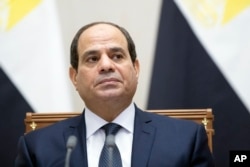Egypt and Israel are in talks to build an undersea natural gas pipeline between the two countries to allow Israel to export increasing quantities of gas to Europe, via its Arab neighbor.
Egypt, Israel, Cyprus, Greece, Jordan and Italy have agreed to increase cooperation as more of the recently developed undersea gas production comes online. Egypt already has a pipeline to Europe, and exports from its large al Zohr undersea field — along with production by its neighbors — are expected to help parts of southern Europe with its gas needs.
Egypt's liquefied natural gas plants are increasing production as more natural gas from its large offshore gas fields comes online. Egypt's neighbors, including Israel, also have been increasing cooperation in an effort to take advantage of and export undersea natural gas production, which has been slowly ramped up since discoveries of the past several years.
Israeli Energy Minister Yuval Steinitz was invited to Egypt's regional natural gas conference Tuesday to discuss further cooperation in exporting Israel's own undersea gas reserves to Europe. Officials from more than a half-dozen countries, including Egypt, Israel, Jordan, the Palestinian Authority, Greece, Cyprus and Italy attended.
Steinitz was the first Israeli minister to be invited to visit Cairo by the Egyptian government since the revolution in 2011, and he lauded the increasing cooperation between the two governments.
He says the development of natural gas in Israel, Egypt and Cyprus has become a motor for geo-strategic and political cooperation across the whole of the eastern Mediterranean. He adds that Egypt, Israel, Jordan, the Palestinian Authority, Cyprus, Greece and Italy will cooperate to develop natural resources for the benefit of the region.
Egyptian President Abdel Fattah el-Sissi, whose nation's own extensive offshore natural gas reserves have proven to be a boon to both the Egyptian treasury and to its own consumers of natural gas, told a recent gathering that Egypt is working hard to develop the resource.
He says that God has blessed Egypt with self-sufficiency and even more than that in natural gas reserves, and it is only for the purpose of increasing the distribution network across the country that the government has raised prices.
Political sociologist Said Sadek tells VOA that Egypt is becoming a regional hub for gas exports and that its neighbors, like Israel, are making use of the fact it has existing undersea pipelines to Europe in order to increase their own exports
"Already Egypt has long pipelines since long ago and [they are] ready. If other countries want to build a pipeline, it is expensive and it will take a long time and they don't have enough gas for sustainable exports," said Sadek. "Egypt has one of the biggest gas fields in the Mediterranean, al Zohr, and that's why Egypt has this potential that they will be exporting and they will take from smaller fields that the neighbors have and buy them, re-export them and make a [profit]."
Sadek says he does not think gas exports to Europe from Egypt, Israel or Cyprus will affect the dependence of Western Europe on Russian natural gas, however, since most of the Mediterranean gas will be going to southern and central Europe. He also says cooperation between Israel and Egypt will not stir up any serious opposition inside the country.
Paul Sullivan, who is an adjunct professor at Georgetown University, is not so sure. He tells VOA "there are still many in Egypt who are anti-Israel [and that] the pipeline would be under risk." He stresses that the region is "fraught with angst and anger," and he argues that ordinary Egyptians "need to understand how this might help them and not just the super rich and well-connected."









